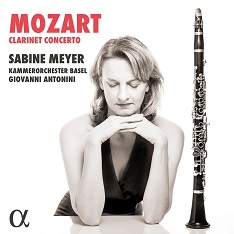Mozart komponierte sein Klarinettenkonzert nur wenige Monate vor seinem Tod, während er gleichzeitig an seinem Requiem arbeitete. Das Werk ist unübertroffen in der Fülle seiner Themen und der Homogenität, die der Komponist dabei erreichte.
Sabine Meyer hat das Konzert bereits mehrmals aufgenommen und scheint das Werk maximal ausloten zu können. Sie spielt es auf einer Bassettklarinette, die Mozarts Klangvorstellungen entspricht, und in Giovanni Antonini hat sie einen Dirigenten, der aus seinen Erfahrungen mit historisch fundiertem Interpretieren schöpft. Im Gegensatz zur alten Abbado-Aufnahme fehlt es in dieser neuen Einspielung weder an Lebendigkeit noch an Phantasie.
Sabine Meyer überzeugt mit einem runden und warmen Ton, schönem Legato und feinster Differenzierung der Farben, und ihr Spiel ist durchweg sensibel, wobei das Adagio besonders hervorzuheben ist, das mit äußerster Zartheit gesungen wird. Die Tempi sind optimal gewählt, weder zu langsam noch zu schnell und so kam eine durchaus klassische und in diesem Segment vorbildliche Aufnahme zustande.
Mozart composed his Clarinet Concerto just a few months before his death, while working on his Requiem. The work is unsurpassed in the richness of its themes and the homogeneity achieved by the composer.
Sabine Meyer has already recorded the concerto several times and seems to be able to fathom the work to the maximum. She plays it on a basset clarinet that corresponds to Mozart’s conception of sound, and in Giovanni Antonini she has a conductor who draws on his experience of historically informed interpretation. In contrast to the old Abbado recording, this new one lacks neither liveliness nor imagination.
Sabine Meyer convinces with a round and warm tone, a beautiful legato and the finest differentiation of color, and her playing is sensitive throughout, especially in the Adagio, which is sung with extreme delicacy. The tempi are well chosen, neither too slow nor too fast, resulting in a thoroughly classical recording that is exemplary in this segment.


















